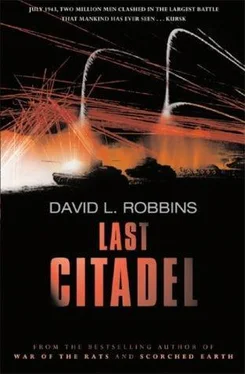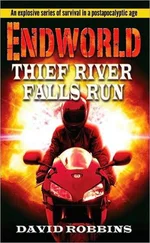He sped over the valley, searching through the whipping flowers for an advantage, anything. The Mark IV was a fleet enough tank to make this race dicey. Fifty meters ahead to the left, a thick column of smoke caught his eye. A T-34 and a Mark IV had rammed each other. The Mark IV had ridden up the Soviet tank’s front. They’d both burst into fireballs. Through the smoke Dimitri spotted their crisscrossed turrets.
Valentin thought of the move the same moment Dimitri did.
‘Come left.’
The smoking pylon of the two fused tanks was only seconds ahead. Dimitri knew what his son intended: Valentin was going to shove the racing Mark IV, putting the two dead tanks right in his path. The German will have to swerve left – he won’t dodge right, closer to us – or stop. Either way, he’ll have to slow down. Valya will guess which way the German’s going to jump. We’ll stop first and have our cannon waiting.
‘Everyone hang on. Papa, full stop!’
Dimitri crammed on the brakes. The General skidded, Dimitri corrected to keep the treads sliding straight. He downshifted fast.
The General tilted forward as though to pour them all out through their hatches but Dimitri had the tank at a dead stop in seconds. Valentin did not fire immediately. The turret whined and rotated degrees right. In his head Dimitri trailed the Mark IV running away, saw it avoid the burning mess in front of it; he imagined the SS commander losing sight of the T-34 that had been broadside for almost a kilometer; the German thought, Oh, no; he screamed at his driver to swerve, evasive turns, now, now!; behind him, not far enough, carefully adjusting, the faster, smarter T-34 commander stayed in his range finder, neither fooled nor hot, following the German with the long eye of his cannon; the German counted seconds, gaining distance; does he shout, Ha ha! that he has got away? Dimitri turned in his seat to watch his son; Valentin toed the firing pedal with an oddly ginger tap for what it set loose; the breech recoiled with a massive shrug; Pasha fed it another round, all one flowing action; Valentin made a small adjustment to his aim and fired again; Pasha never left his knees, never seemed to be without a shell in his arms; Valentin fired again; three smoking casings lay on the matting; did the German commander count the shells coming in when he was done counting seconds?
‘Let’s get going, Papa.’
For thirty minutes, the General wandered over the valley floor, looking for jousts like a medieval knight. The sunflower field lay in total ruin, flattened under so many tracks, so much wrath and murder. Shapes strayed in the smoke. Valentin fired only a dozen more times, reporting no hits. Dimitri had no idea how the battle was going; who was winning? The tally of stilled Soviet tanks was greater than those of the Germans. This was no surprise to him; the Red force in these sunflowers had been held in reserve until Prokhorovka, they’d been untested in Kursk. These Germans were hardened SS. Dimitri felt hunted. He was always lost, reacting to shadows, boots stamped on his shoulders, he ran through stretches of sunflowers left standing that blinded him again, then emerged to no landmarks but more dead hulks. He saw tankers of both armies, out of their machines, scurrying to get away. Sasha took shots at them. He was never certain if the boy shot at SS or Russians, they all ran like any man would. He drove, in circles, straight, he stopped and started, he swerved. He stayed in a clench on the steering levers and waited, moving, never before so scared as he was now.
He drove past a beheaded T-34. The tank’s turret lay upside down ten meters from the chassis, pouring fumes. In seconds another ruined Red tank smoldered nearby. Valentin’s boot guided the General in a wide semicircle to the right, past four more destroyed T-34s, all of them arranged in a singed arc, a clock face of dead tanks.
‘Jesus,’ Valentin muttered.
‘What?’ Pasha demanded to know. He did not curb his impatience and Valya didn’t reprimand him. ‘What?’ the boy insisted.
‘Tiger,’ Valentin told them.
Luis chose the targets.
Balthasar ruined them.
The air hung brackish with haze. After an hour of combat in the sunflower field, fifty tanks burned. Each black spire of smoke fed the haze. Luis stood in his cupola to peer through the mists. High above, rain clouds threatened, dimming the day even more. The optics in the Tiger were excellent, but they could not pierce far enough into the swirling battle. The eyepieces did not draw out Luis’s instincts the way his raw eyes could. He remained half outside the tank, turning circles in the cupola, taking in the battle. He could not slake his hunger for the fight, keenly watching tanks of both sides dart through the shifting mists and thinning sunflowers. Packets of crackers stayed in his breast pocket, he let his body hunger like his heart. He followed one Red tank after another, even those thinly visible through the haze. When he knew what that tank would do, where it would turn, or when it would stop, he called Balthasar into the shot. Together, they rarely missed.
The wound in his chin slowed its drip, but not before Luis’s breast glistened with blood. He ignored this and stood tall in the cupola, aware of the image he cast, stolid and brave in the Tiger’s turret. Other Leibstandarte tanks roared past his place in the middle of the field. Luis was careful to show them a smoking barrel, himself in profile, raising a blood-smirched hand to single out another target. The motionless T-34s in a cemetery ring around his Tiger were testimony. This was the makings of legend: Luis, deathly thin and pale, blood-spattered, while his Tiger was the most powerful weapon on the battlefield. There would be talk of la Daga after today.
Luis had not moved the Tiger more than two hundred yards in any direction since firing his first shots. The Reds kept their distance, preferring to tangle with the less lethal Mark IVs, dancing in and out of the mists around Luis. Sometimes they darted at him, swooping in closer for a shot and paying for it. For minutes at a time, tanks of his company came to stand by him, idling on his flanks, hoping they were safer in the Tiger’s shadow. Luis let them rest to admire his and Balthasar’s shooting, then sent them back into the melee, like a father ordering his son outside to face a bully.
He watched one of his Mark IVs leave his side. At three hundred meters, just before disappearing into the mists, the tank was challenged by a T-34. Luis lifted his binoculars and followed the action between the two tanks. They entered into a race, vaulting across the field at top speeds, like two stallions, dashing, almost bumping each other. The Russian was cunning, he steered the Mark IV toward a wreck, making the German commander veer hard, slow down. The Red skidded to a remarkably quick stop, the tank seemed to hop to a standstill. The third shell from the Russian hit the SS tank in the rear; another shaft of smoke added its charcoal tarnish to the sky. Luis did not pull his binoculars from this Russian tank. He watched it circle, careful and nimble all at once. The Russian drove past several of the T-34s he and Balthasar had knocked out. There was an interesting quality to how this one tank moved through the battle and carnage. That race with the Mark IV was phenomenal, but now it seemed to skulk. What did this tank carry inside? It looked like heroism and reluctance married somehow. And something more, something rare. What? Luis considered, calculating.
The Red tank slowed, and Luis knew they had seen each other.
‘Balthasar. Sixty degrees right.’
The great turret pivoted around Luis. The gun barrel did not raise at all, every target in the sunflower field was so close there was no need for elevation. Every shot was a flat trajectory.
Читать дальше












